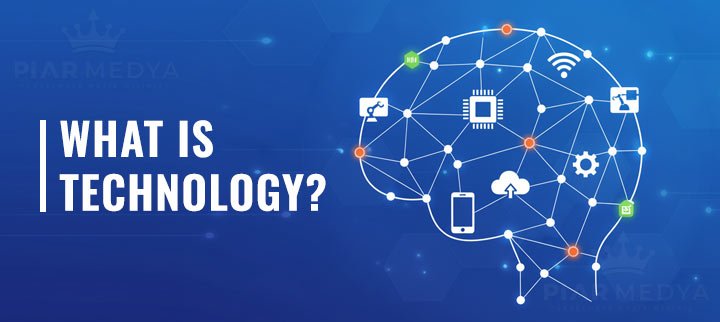What is Technology and What Does It Do? (History, Benefits, and Future)
What is technology? Discover its history from the invention of the wheel to artificial intelligence, the benefits it brings to our lives, and the revolutions that await us in the future. The most comprehensive guide. You will find answers to all your questions related to topic What is Technology and What Does It Do? (History, Benefits, and Future) in the continuation of the text.

A Comprehensive Guide on the History, Benefits, and Future of Technology
Part 1: What is Technology? It's Not Just About Devices
Part 2: From the Wheel to Artificial Intelligence: The Historical Evolution of Technology
Part 3: The Benefits of Technology for Society and the Individual
Part 4: Technology Fields Shaping Today's World
Part 5: What's on the Horizon? The Future of Technology
Conclusion: Technology is a Tool, The Goal is the Advancement of Humanity
From the first human to control fire to the civilization that sends robots to Mars, there is a single common force that has shaped human history: Technology. When most of us hear this word, we think of modern marvels like smartphones, computers, or artificial intelligence. Yet, technology is much more than that. A wheel, a printing press, even a simple plow that started agriculture... All were the revolutionary technologies of their own era.
A Comprehensive Guide on the History, Benefits, and Future of Technology
What is technology really? What does it do, and how does it fundamentally change our lives? In our comprehensive guide, we will explore the deep meaning of technology that goes beyond mere devices, witness its incredible evolution throughout history, and examine its benefits today and what awaits us in the future. If you're ready, let's embark on a journey through the millennia-long adventure of human intelligence and imagination.
Part 1: What is Technology? It's Not Just About Devices
In its most basic and simple definition, technology is the application of scientific knowledge to find solutions to practical problems. It is the entirety of tools, machines, techniques, systems, and methods developed to meet a need or make a task more efficient.
We can think of technology as a process:
- Need or Problem: A basic need like communicating, sheltering, or feeding.
- Idea and Knowledge: Utilizing scientific principles or observations to meet the need.
- Application and Design: Designing a tool, method, or system using that knowledge.
- Result: A tangible "technology" that meets the need (e.g., a telephone, a house, an irrigation canal).
In summary, from this perspective, the pen in your hand, the book you're reading, and the clothes you're wearing are all forms of technology.
Part 2: From the Wheel to Artificial Intelligence: The Historical Evolution of Technology
The development of technology is also a summary of human history. Each era has stood on the shoulders of the one before it.
- Ancient Times and the Agricultural Revolution: The invention of the wheel, the discovery of writing, irrigation systems, and simple machines enabled humanity to transition to settled life and establish the first cities.
- The Industrial Revolution (18th and 19th Centuries): The invention of the steam engine moved production into factories. Trains and the telegraph shortened distances and connected the world.
- The Information Age (20th Century): The invention of the transistor laid the foundation for computers, and the development of the internet created a global communication network. This era democratized the production and dissemination of information.
- The Smart Age (21st Century): With smartphones, cloud computing, social media, and the Internet of Things (IoT), technology has become integrated into every moment of our lives. Revolutionary technologies like Artificial Intelligence (AI) and Blockchain have opened the doors to a new era.
Part 3: The Benefits of Technology for Society and the Individual
The proper use of technology improves our quality of life and advances our civilization.
- Communication and Access to Information: We can access information from the other side of the world in seconds and have video calls with our loved ones instantly.
- Efficiency and Automation: From robots in factories to software that organizes our emails, technology automates repetitive tasks, freeing up time for people to focus on more creative and strategic duties.
- Health and Medicine: Thanks to MRI machines, genetic therapies, robotic surgery, and vaccines, human lifespan has increased, and revolutions have occurred in the fight against diseases.
- Educational Opportunities: With online courses, digital libraries, and educational apps, learning has now transcended geographical and economic boundaries.
- Transportation and Logistics: Thanks to high-speed trains, airplanes, and advanced logistics networks, people and products can move around the world much faster and more safely.
Part 4: Technology Fields Shaping Today's World
Today, technology is advancing rapidly in many different disciplines. Here are some of the most influential:
- Information and Communication Technologies (ICT): Encompasses internet infrastructure, software, hardware, and mobile networks. Services like web design and digital marketing, which enable businesses to exist in the digital world, are applications of this technology.
- Artificial Intelligence (AI) and Machine Learning: Systems that can learn from data and make human-like decisions. They are transforming every sector from finance to health, and from marketing to art.
- Biotechnology and Genetics: Aims to develop new products using living organisms. It is used in fields like drug production, gene therapies, and agricultural efficiency.
- Energy Technologies: Includes the development of renewable energy sources like solar and wind, and solutions that increase energy efficiency.
- - Space Technologies: Make essential daily services like GPS satellites, weather forecasting, and global communication possible.
Part 5: What's on the Horizon? The Future of Technology
The evolution of technology is accelerating exponentially. Here are some areas expected to fundamentally change our lives in the near future:
- Artificial General Intelligence (AGI): Artificial intelligence capable of performing any cognitive task that a human can. For more information, you can read our article "What is AGI?".
- Internet of Things (IoT) and Smart Cities: A world where billions of devices are connected, sharing data, and automating our lives.
- Extended Reality (XR): The convergence of Virtual Reality (VR) and Augmented Reality (AR), erasing the boundaries between the physical and digital worlds.
- Blockchain and Web3: The foundations of a new, decentralized, more transparent, and user-centric internet. For marketing strategies in this area, you can review our Web3 Marketing Guide.
- Quantum Computing: Next-generation computers that can solve complex problems in seconds that even today's supercomputers cannot solve.
Conclusion: Technology is a Tool, The Goal is the Advancement of Humanity
Technology is neither good nor bad in itself. It is a reflection of humanity's imagination and intellect, a result of the desire to find solutions to problems. How we use it will shape our future accordingly. As a business owner, a student, or a curious individual, understanding technology means understanding not just today's world, but tomorrow's as well.
Are you ready to use technology as a lever to grow your business, increase your efficiency, and reach your target audience? Discover Piar Medya's digital technology solutions and carry your brand into the future.






